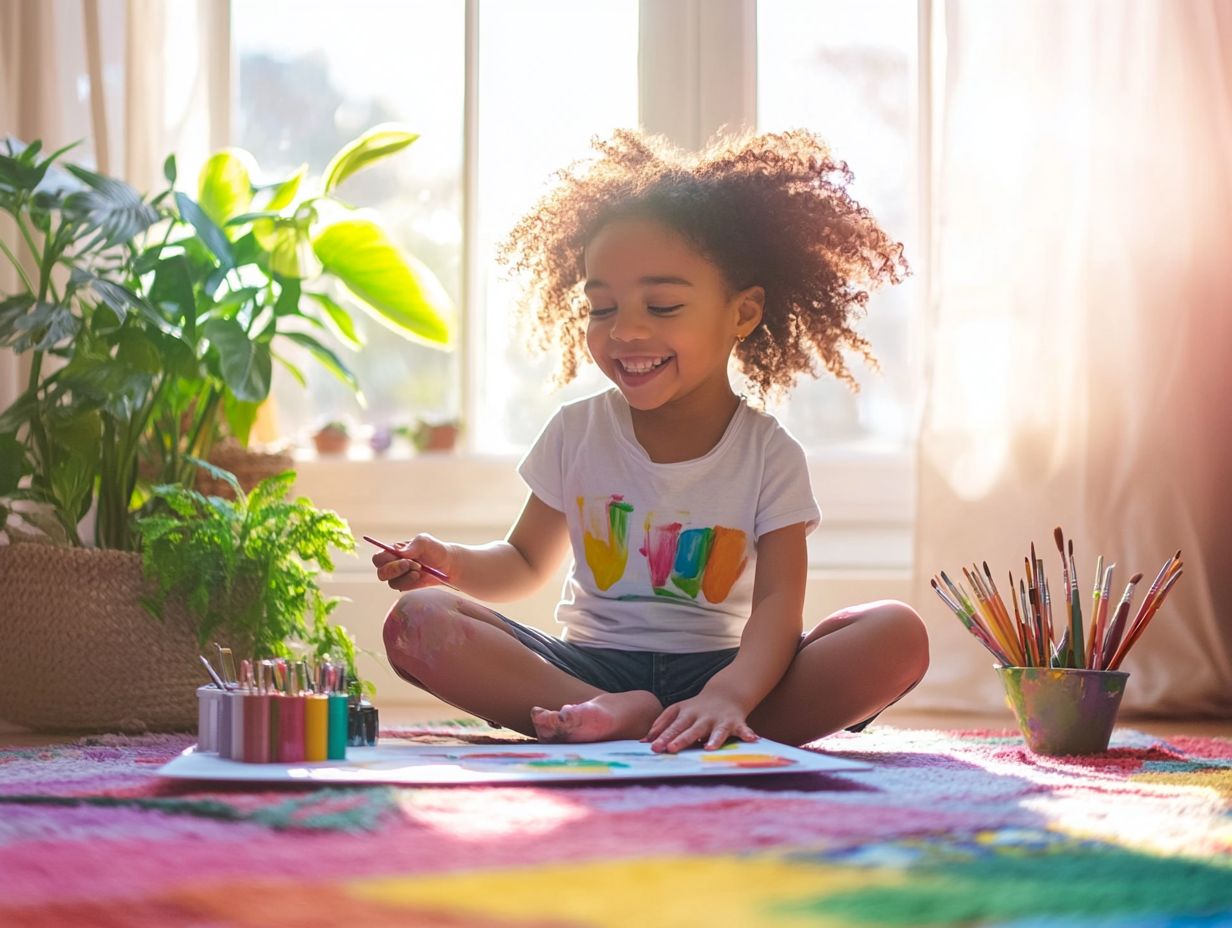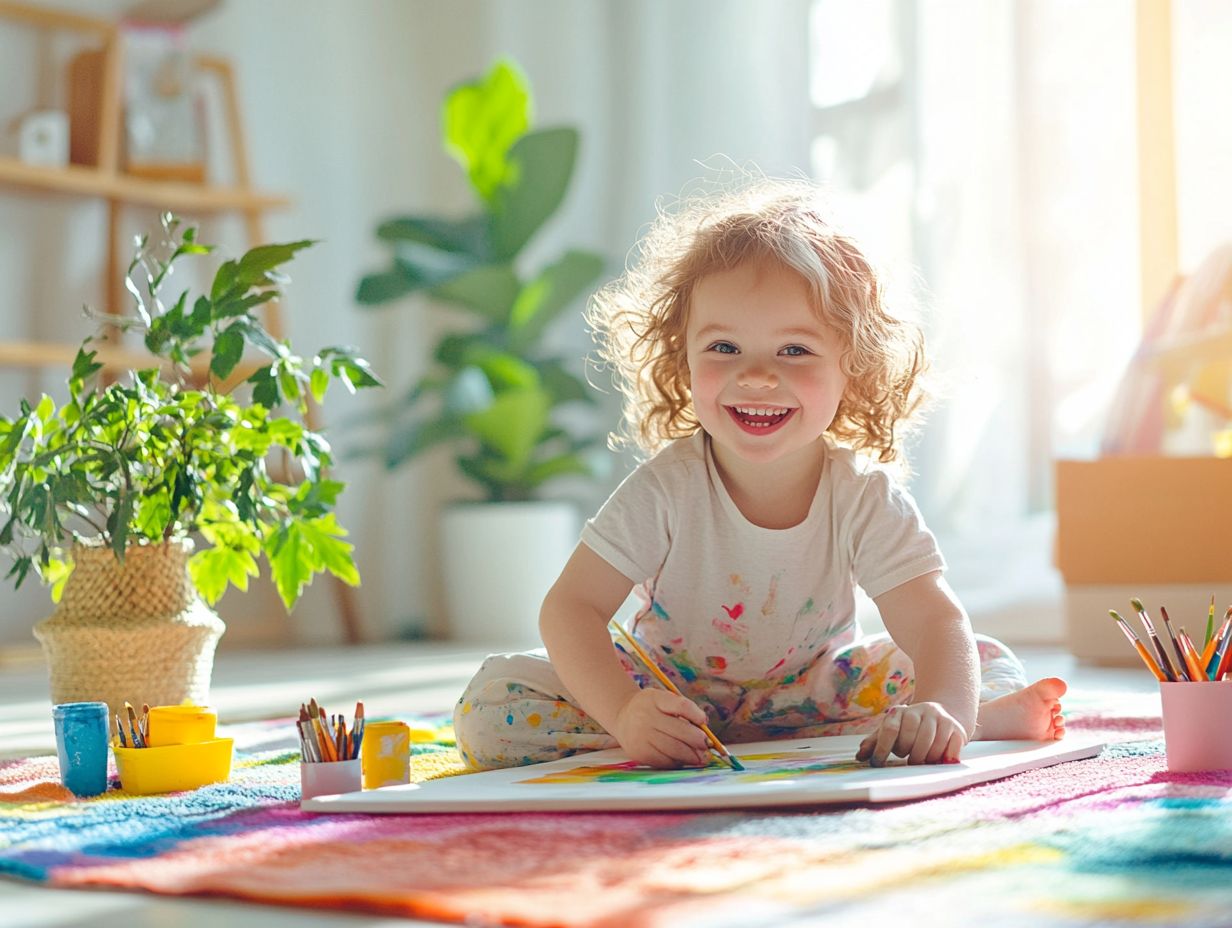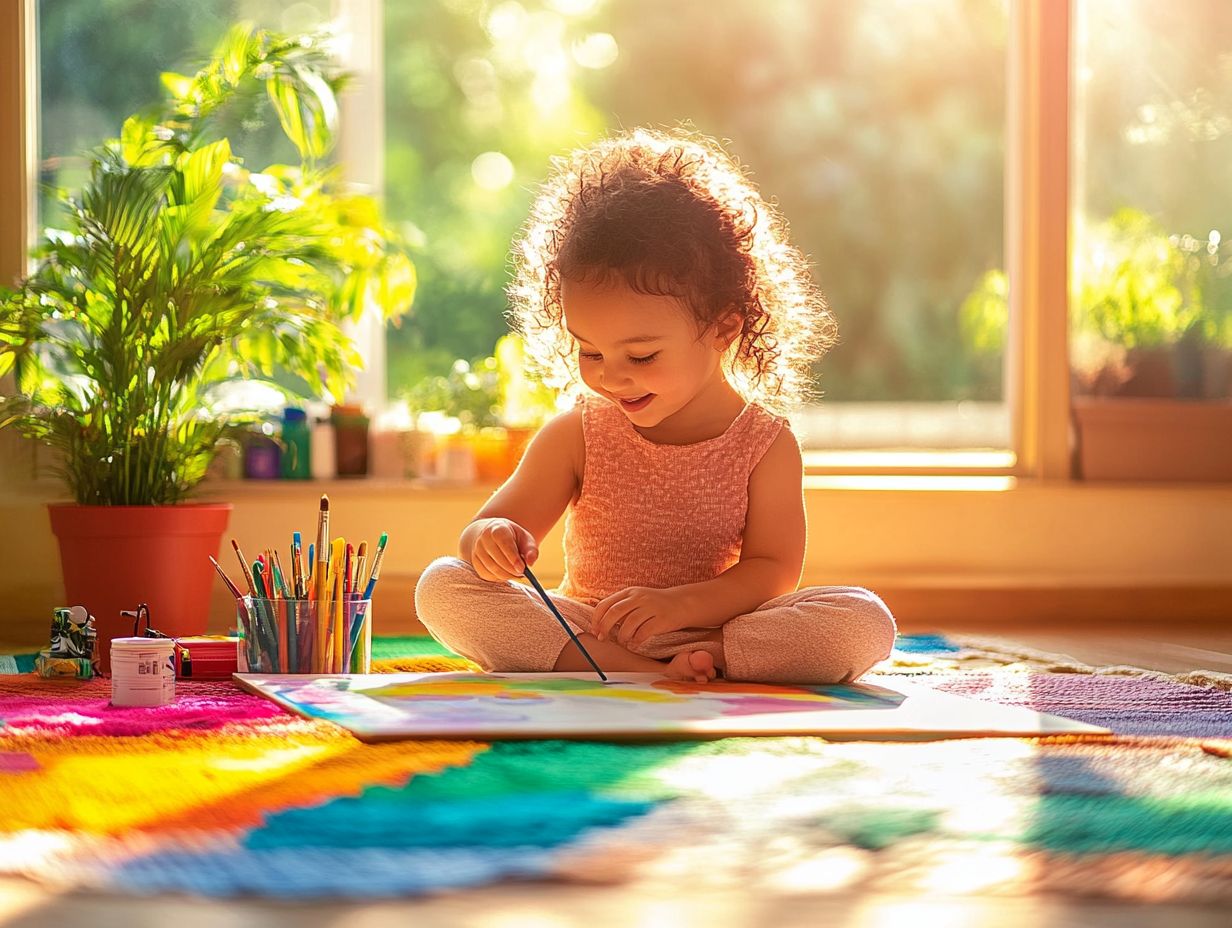Understanding the Impact of Self-Care on Kids
In today’s fast-paced world, it’s essential for you to teach kids the importance of self-care. Effective self-care practices can help children manage stress and develop healthy routines.
Self-care not only enhances children’s overall well-being but also nurtures emotional intelligence, resilience, and a sense of independence. This encompasses an understanding of various types of self-care physical, emotional, social, and spiritual as well as practical tips for you as a parent to instill these valuable habits. Engaging activities can transform self-care into a fun adventure with engaging activities that excite your kids!
Contents
Key Takeaways:

- Teaching self-care to kids can have numerous benefits such as developing emotional intelligence, reducing stress, and improving mental health.
- Parents should lead by example and encourage independence when teaching self-care to their kids.
- Fun self-care activities for kids include mindfulness exercises, creative expression, outdoor play, gratitude practice, and keeping a gratitude journal.
The Importance of Self-Care in Child Development
Self-care is an essential element in childhood development. It significantly contributes to promoting healthy habits and mental well-being in children. By instilling self-care practices early on, you enable your kids to effectively manage stress, handle school stress, and cultivate crucial life skills that encourage independence and emotional regulation. Cognitive self-care and relaxation techniques enhance their overall mental well-being.
Furthermore, fostering social connections and positive interactions through community involvement can enhance your children’s self-esteem and overall happiness. These activities, such as wellness activities and nurturing connections, are essential for mental well-being. It s vital for you as a parent to recognize the importance of self-care in meeting your children’s emotional needs, ensuring they grow into resilient adults capable of tackling life’s challenges.
What are the Benefits of Teaching Kids Self-Care?
Teaching kids self-care can unlock a world of benefits, significantly enhancing their mental health and emotional intelligence. When children learn self-care techniques like mindfulness exercises and relaxation methods they develop crucial coping strategies that help them manage anxiety and stress. These practices do wonders for boosting their self-esteem and enable them to become more independent, fostering the resilience needed to tackle life s challenges. By integrating self-care into their daily routines, you can cultivate habits that profoundly impact a child’s overall well-being.
As your children engage in self-care activities, they’ll become more self-aware, recognizing their emotions and triggers. This heightened awareness allows them to navigate interpersonal relationships with greater ease. With improved emotional regulation, they can prevent overwhelming feelings from spiraling out of control, equipping them with the tools to confront challenges confidently.
Ultimately, by prioritizing self-care, children build a solid foundation for emotional stability and develop a lifelong appreciation for maintaining their mental health. This ensures they are ready to tackle obstacles and thrive in any situation life throws their way, using effective coping strategies and stress relief techniques.
Start today by choosing one self-care activity to enjoy with your child!
How Can Self-Care Help Kids Develop Emotional Intelligence?
Self-care practices play a crucial role in helping you nurture emotional intelligence in children, a vital skill for navigating their feelings and relationships. By engaging them in mindfulness exercises and encouraging journaling, you enable them to identify and understand their emotional needs. This fosters greater self-awareness and empathy towards others.
These essential skills enable children to respond appropriately to various social situations. They build resilience against stress and anxiety through calming techniques and thinking about how they feel. When they practice techniques like yoga or participate in family activities that promote open communication, they gain valuable insights into their own emotional states as well as those of their peers.
Such experiences help children learn to manage their emotions. They also highlight the importance of family support, creating a safe space for exploring feelings and understanding emotional needs. This collective engagement enables children to develop robust coping mechanisms, ensuring they are well-prepared to tackle life’s challenges with confidence and grace.
What are the Different Types of Self-Care for Kids?
Self-care encompasses a range of practices that can be categorized into distinct types, each targeting specific aspects of your child’s well-being. Physical self-care involves activities that promote health and wellness, like engaging in physical activity. This can significantly enhance mental health. Additional practices include stress management and maintaining healthy habits.
Emotional self-care is all about addressing emotional needs through mindfulness activities and effective coping strategies. Then there’s social self-care, which nurtures positive interactions and community involvement.
Lastly, spiritual self-care encourages your child to explore personal beliefs and values, fostering a sense of purpose and connection to the world around them. By understanding these categories, you can better support your child’s overall wellness in a meaningful way.
1. Physical Self-Care
Physical self-care is absolutely essential for children. It encompasses activities that not only promote their physical health but also enhance their overall well-being. When they engage in regular physical activity, whether it s through sports or outdoor play, they re not just building healthy habits; they re also discovering an effective way to relieve stress.
Incorporate relaxation exercises, downtime, and thinking about how they feel into their routines. This helps them recharge and rejuvenate, significantly boosting their ability to handle life s challenges and pressures.
Establishing a consistent routine that prioritizes physical self-care encourages children to cultivate lifelong habits that benefit their mental and emotional health.
Simple practices, like maintaining a balanced diet, staying hydrated, and ensuring they get adequate sleep, complement their physical activities. They contribute to improved concentration and mood. Such healthy habits are crucial for emotional and mental health.
Encouraging children to explore different forms of exercise be it dance, swimming, or biking can keep them engaged and foster a positive relationship with physical fitness.
Ultimately, the holistic benefits of these routines foster resilience, enhance self-esteem, and enable them to navigate the complexities of their daily lives and future challenges with confidence. By embracing these practices, children can grow stronger, both physically and emotionally, ready to take on whatever comes their way!
2. Emotional Self-Care
Emotional self-care is vital as it centers on nurturing your emotional well-being through practices that help you manage your emotions. Integrating positive affirmations and calming techniques can be particularly beneficial in this process. Engaging in activities such as mindfulness exercises, journaling, and positive affirmations allows you to express your feelings and manage stress effectively.
By incorporating coping skills and relaxation techniques into your daily routine, you build resilience and cultivate a better understanding of your emotional needs. This paves the way for healthier emotional development.
Participating in these self-care practices enables you to identify and articulate your emotions, a crucial aspect of emotional intelligence. Mindfulness exercises, like deep breathing or guided imagery, help you stay present in the moment, alleviating anxiety and fostering a sense of calm.
Through journaling, you create a safe space to reflect on your thoughts and experiences, promoting self-discovery and emotional insight. Ultimately, as you develop your unique coping strategies, you cultivate a sense of agency over your feelings, reinforcing your ability to navigate life’s challenges with confidence and adaptability.
3. Social Self-Care

Social self-care is essential for your child’s development, nurturing healthy social interactions and relationships. When they engage with peers and participate in community activities, they significantly boost their self-esteem and emotional well-being.
By encouraging your child to cultivate nurturing connections and engage in positive interactions, you help them develop a sense of belonging and support, vital for their overall mental health. These social interactions are crucial for teaching your child important life skills like empathy, communication, and cooperation.
When your child participates in group activities be it sports, clubs, or volunteer work they learn to navigate social dynamics, resolve conflicts, and appreciate diverse perspectives. These experiences enable them to form meaningful relationships that enrich their lives and contribute positively to their emotional development.
Community involvement fosters a sense of responsibility and connection to others, reinforcing the notion that they are part of something larger than themselves. It s essential for your child’s well-being!
4. Spiritual Self-Care
Spiritual self-care is all about engaging in practices that allow you to explore your beliefs and values, ultimately fostering inner peace and emotional balance. Activities like mindfulness, meditation, and gratitude exercises can guide you in reflecting on your experiences and discovering meaning in your life. By nurturing your spiritual well-being, you enhance your emotional needs and gain a deeper understanding of yourself and your place in the world.
This holistic approach can dramatically boost your mental health! This journey of self-discovery equips you with effective coping strategies to tackle life’s challenges. Embracing spiritual self-care enables you to manage stress more effectively and builds resilience against emotional turmoil.
The ability to pause, reflect, and connect with your inner self enriches your personal growth and promotes healthier relationships with others. This allows you to express your feelings and emotional needs with compassion.
Are you ready to explore your beliefs and values? Utilizing various mindfulness exercises like deep breathing and journaling can further enhance your self-awareness and coping skills.
How Can Parents Teach Self-Care to Their Kids?
Parents hold a crucial responsibility in instilling the principles of self-care in their children. This enables them with the skills necessary for emotional and physical well-being. One of the most effective strategies is leading by example. When you actively engage in self-care, your children are much more likely to embrace those healthy habits themselves.
Promoting independence is vital. Allowing your children to make their own choices regarding self-care helps them feel responsible for their well-being and fosters self-awareness. Creating a nurturing family environment, where kids feel secure in expressing their emotional needs, is essential for cultivating these skills. Moreover, community involvement and family support can enhance these efforts, providing a broader network of positive interactions and social connections.
1. Lead by Example
Leading by example is an incredibly effective strategy for teaching your children the art of self-care. Children are likely to emulate the behaviors they see around them. When you prioritize your own self-care, you illustrate the importance of maintaining healthy habits be it through engaging in physical activities, practicing mindfulness, or openly discussing emotional regulation.
This modeling sets an inspiring standard and encourages your children to weave self-care into their everyday lives. By establishing and sticking to regular routines that include wholesome meals, adequate sleep, and dedicated time for relaxation, you convey a powerful message about the significance of self-care.
When you share your experiences with stress management and how you navigate challenging emotions, you enable your children to appreciate the importance of emotional regulation. Participating in family activities that promote physical health, such as biking together or cooking nutritious meals, reinforces these vital habits.
In doing so, you create a nurturing environment and foster resilience and well-being in your children. This equips them with the tools they need for a balanced life. Incorporating positive affirmations and gratitude journals can further enhance their emotional well-being.
2. Encourage Independence
Encouraging independence empowers your children to take charge of their self-care journey! It enables them to make choices that satisfy their emotional needs. By providing opportunities for kids to select their own coping strategies whether it s opting for mindfulness exercises or engaging in physical activity you help them feel responsible for their well-being.
This autonomy enhances their self-awareness and builds resilience, equipping them with the skills necessary to tackle life s challenges. When you allow children to explore various self-care practices, you help them identify what resonates most with their personalities.
This exploration might include simple activities like letting them choose their own bedtime routine. This not only boosts their confidence but also encourages them to express their preferences and needs. As they learn to articulate what helps them feel secure and calm, they develop vital emotional vocabulary that aids them during challenging times.
Ultimately, fostering this independence is crucial in helping youngsters grasp the importance of self-care while cultivating a lifelong commitment to their mental and emotional well-being. Incorporating self-care benefits like downtime and relaxation techniques can further support their growth.
3. Create a Routine
Creating a structured self-care routine can significantly benefit your children. It establishes healthy habits and promotes emotional regulation. Start today set aside just 15 minutes to establish a routine that will transform your child’s emotional health!
Encourage them to try different activities. This helps create a well-rounded approach to their wellness. Consider scheduling time for physical exercise, which boosts endorphins and lifts their mood, alongside mindfulness practices like meditation or journaling. These activities foster self-awareness and emotional expression.
Incorporating downtime is essential; it allows your kids to relax and recharge, contributing to their emotional balance. It s important for you to model these behaviors, demonstrating the significance of balancing responsibilities with relaxation.
Establishing such routines enables your children to prioritize their well-being and instills a sense of discipline and resilience that will serve them well throughout their lives. Including activities like cognitive self-care (activities that stimulate your mind and help you think clearly), emotional self-care, and physical self-care can diversify their routines.
What are Some Fun Self-Care Activities for Kids?
Self-care activities for kids can be enjoyable and beneficial. They help children cultivate healthy habits while exploring their emotions and creativity.
Engaging in activities like mindfulness exercises, outdoor play, and creative expression enhances their emotional regulation and fosters positive interactions with peers and family.
Practicing gratitude through journaling or group discussions instills a sense of appreciation and strengthens overall mental well-being. This transforms self-care into a delightful experience for children. Introducing them to relaxation exercises and wellness activities can further enhance their self-care practices.
1. Mindfulness Exercises

Mindfulness exercises offer a remarkable opportunity for children to cultivate emotional regulation and develop essential coping skills. These practices, which can include techniques like deep breathing, guided imagery, or simple meditation sessions, enable kids to focus on the present moment and effectively reduce feelings of anxiety.
By incorporating mindfulness activities into daily routines, you enhance your child’s self-awareness and contribute to their overall mental health and resilience.
Engaging in mindful walking, where children pay attention to their surroundings and the sensations in their bodies, can significantly bolster their ability to cope with stress. You might also consider introducing them to mindfulness apps designed for young audiences. These apps can impart practices such as loving-kindness meditation, encouraging compassion towards themselves and others.
These diverse exercises equip children with the tools they need to navigate their emotions effectively, fostering healthier responses to challenges. As they embrace these techniques, they enhance their emotional intelligence and lay a stronger foundation for enduring mental well-being throughout their lives. Including calming techniques can further aid in managing anxiety and stress.
2. Creative Expression
Creative expression is a remarkable self-care activity for you as a caregiver, offering children a vital outlet to articulate their feelings and experiences. By introducing mediums like drawing, painting, or writing, you enable them to explore their emotional needs and enhance their mental well-being.
Incorporating art therapy, a therapeutic practice that uses art to help people express their feelings, or creative projects into their daily routines fosters self-discovery and builds resilience. This transforms self-care into a delightful and impactful practice.
These activities allow children to unleash their emotions and truly express themselves. For example, engaging in music or dance can serve as a dynamic form of expression, while storytelling encourages cognitive development and ignites the imagination.
Each of these creative outlets plays a unique role in addressing the emotional landscape of childhood. They offer therapeutic benefits that contribute to improved self-esteem and social skills. By encouraging exploration through these various forms of art, you become instrumental in nurturing a child’s emotional intelligence and overall well-being. The inclusion of professional self-care and social self-care can also provide comprehensive support for their development.
Integrate these self-care practices into your child’s routine for lasting benefits. Together, you can create a nurturing environment that fosters their growth and happiness.
3. Outdoor Play
Outdoor play is an essential self-care activity for children, offering numerous benefits for both physical and mental health. Engaging in physical activity outside, whether through sports or free play, not only promotes healthy habits but also serves as a natural stress relief method.
Outdoor play enhances social interactions, allowing kids to develop friendships and foster positive connections in a natural setting, further contributing to their emotional well-being.
By participating in activities like climbing, running, or playing team games, your children can improve their cardiovascular fitness and motor skills while simultaneously boosting their mood through the release of endorphins. Nature provides a stimulating environment filled with exploration opportunities, igniting their creativity and curiosity.
The interaction with peers during outdoor activities encourages communication skills and teamwork, which are essential for their social development. As outdoor play becomes a regular part of their routine, your children will not only enhance their physical capabilities but also cultivate resilience, reducing feelings of anxiety and promoting overall happiness. Integrating academic pressure relief techniques can also support their balanced growth.
4. Gratitude Practice
Gratitude practice is a powerful tool for enhancing mental well-being and fostering a positive outlook on life. Encouraging your children to maintain a gratitude journal or engage in regular group discussions about things they are thankful for can instill a sense of appreciation and contentment. These practices not only boost their emotional health but also strengthen their social connections, creating nurturing bonds.
Practicing gratitude serves as a profound self-care activity for children, significantly enhancing their emotional well-being. By engaging in gratitude journaling or joining family discussions centered around appreciation, kids can shift their focus toward the positive aspects of their lives, fostering a mindset rich in gratitude and resilience. This simple yet impactful practice encourages them to acknowledge their feelings while cultivating a deep sense of connection, contentment, and self-awareness.
Incorporating gratitude into daily routines offers various possibilities. For instance, starting each day with a morning reflection where they share what they are thankful for can set a positive tone. Alternatively, creating a gratitude jar to collect notes of appreciation throughout the week can add a fun, visual element to this practice, promoting mental well-being.
These activities help children develop the habit of recognizing the good around them, an essential skill for emotional resilience and self-awareness. Encouraging them to express gratitude through thank-you notes or acts of kindness not only instills empathy but also strengthens social bonds and community involvement.
Through regular gratitude practices, children come to understand the value of self-care, leading to improved self-esteem, independence, and a more positive outlook on life.
How Can Self-Care Help Kids Cope with Stress and Anxiety?
Self-care is an essential resource for supporting children as they navigate stress and anxiety, equipping them with effective strategies like relaxation techniques to manage overwhelming emotions.
By embracing self-care practices like mindfulness, physical activity, and creative expression, children can learn to recognize their stressors and cultivate healthy coping mechanisms that foster resilience.
These techniques do more than just relieve immediate stress; they enable children with the skills needed and coping strategies to tackle future challenges, ultimately enhancing their overall emotional well-being and self-esteem.
1. Reducing Stress Levels
Reducing stress levels is one of the key benefits of self-care for children. It equips them with essential relaxation techniques and ways to handle challenges. Incorporating activities like deep breathing, mindfulness exercises, and physical play into their routines will help kids release tension and cultivate emotional balance.
When children learn to manage stress effectively, they enhance their overall mental well-being and develop a healthier response to future challenges. These self-care techniques are vital in helping young minds build resilience. Engaging in creative activities such as drawing or journaling provides an emotional outlet and fosters a sense of accomplishment.
Regular physical activity is also crucial as it can elevate mood by releasing endorphins, which helps alleviate anxiety levels. Practice gratitude through simple reflection exercises to help children shift their focus from stressors to positive experiences. Incorporate positive affirmations into their daily routine to boost their self-esteem and emotional health.
By integrating these fun activities into their daily lives, kids learn to navigate their emotions more effectively. This equips them with valuable tools for life beyond the classroom and promotes healthy habits. Start these self-care practices today to equip your child with the resilience they need for tomorrow!
2. Building Resilience
Building resilience is essential for children as it prepares them to confront adversity and navigate challenges with confidence. Engaging in self-care activities that emphasize emotional management and coping skills significantly enhances their ability to bounce back from setbacks.
Practices like mindfulness, journaling, and regular physical activity play a pivotal role in fostering resilience and laying a strong foundation for emotional health. Being involved in community activities can provide social support and enhance their sense of belonging.
These fun activities give children a channel to express their feelings. They also instill a sense of control over how they react to stress. When kids immerse themselves in creative outlets, they can process emotions through art or writing. Meanwhile, physical activities spark endorphin release, boosting mood and well-being.
Positive interactions with others can improve social skills and self-esteem. Establishing a routine that incorporates these self-care practices promotes consistency, which is vital for emotional stability. As children learn to self-soothe and develop effective coping mechanisms, they become better prepared to navigate the ups and downs of life. Cultivating nurturing connections with family and friends further enhances their emotional security.
3. Improving Mental Health

Improving mental health is a crucial benefit of incorporating self-care practices into children s lives. When you engage them in self-care activities that address their emotional needs, you’re helping them develop essential coping strategies that enhance their overall well-being.
By prioritizing routines that feature mindfulness, physical activity, and social interactions, you set the stage for them to cultivate a positive mindset and the ability to bounce back from tough times, which significantly benefits their psychological health. Establishing healthy routines helps their mental health.
Creating opportunities for creative expression through art or music can also be a therapeutic outlet. This allows children to articulate their feelings effectively. Fostering connections with peers and encouraging participation in team sports or group activities helps them build supportive relationships, reinforcing their sense of belonging.
Engaging in social self-care activities enhances their ability to form positive social connections. Make regular family time a must! It boosts their emotional security and stability. By weaving these self-care practices into their daily lives, you ensure that they feel valued and understood while growing into emotionally healthy, self-aware individuals capable of navigating life s challenges with confidence.
Incorporating downtime for relaxation and reflection further supports their emotional well-being.
Frequently Asked Questions
What is self-care and why is it important for kids?
Self-care refers to activities and practices that help maintain and improve one’s physical, mental, and emotional well-being. It is important for kids because it helps them develop healthy coping mechanisms, build resilience, and promote overall well-being. For example, engaging in mindfulness activities can help children manage stress and anxiety effectively.
What are some examples of self-care activities for kids?
Self-care activities for kids can include spending time outdoors, engaging in creative activities such as painting or drawing, practicing mindfulness and relaxation techniques, and engaging in physical activities like sports or dancing. Additionally, maintaining a gratitude journal can help children focus on positive aspects of their lives.
How does self-care impact a child’s development?
Let’s explore how self-care positively impacts children! Self-care plays a significant role in a child’s development by promoting self-awareness and building confidence. It also improves their ability to regulate emotions and helps them develop healthy habits and coping skills for adulthood.
Encouraging relaxation exercises supports emotional regulation.
What are the benefits of teaching kids about self-care?
Teaching kids about self-care helps them understand their own needs and enhances their problem-solving skills. It promotes a positive attitude towards self-care and self-love, allowing them to prioritize their well-being and build resilience.
Engaging in activities that stimulate the mind and physical self-care can also enhance their overall well-being.
How can parents and caregivers encourage self-care in kids?
Parents and caregivers can encourage self-care by setting a good example and providing opportunities for self-care. Open communication about emotions and self-care needs is essential.
Creating a supportive environment that prioritizes self-care is crucial. Incorporating parent tips and strategies can further reinforce children’s self-care habits.
What are some warning signs that a child may need more self-care?
Act quickly if you notice these signs! Warning signs that a child may need more self-care include increased irritability, difficulty sleeping, and withdrawing from social activities.
Pay attention to these signs and address them by incorporating more self-care practices into the child’s routine. Engaging in professional self-care activities, such as counseling, can also be beneficial.






